Chauvin Pre-trial Day 6 Midday: Civil Settlement Becomes An Issue, As Ninth Juror Seated
Three Jurors Profess Cannot be Fair & Impartial, Excused
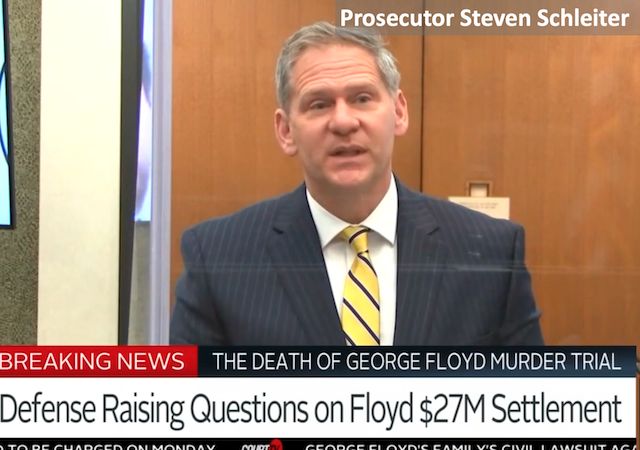
Welcome to our ongoing coverage of the Minnesota murder trial of Derek Chauvin, over the in-custody death of George Floyd. I am Attorney Andrew Branca for Law of Self Defense, providing guest commentary and analysis of this trial for Legal Insurrection.
As a reminder, I am “LIVE Parlering” the trial in real-time over at my Parler account, which you can find using my Parler handle: @LawofSelfDefense.
This morning’s proceedings began prior to the start of the voir dire (jury selection) process with some ongoing discussion over motions in limine, as well as the defense raising substantial concerns about the impact on defendant Chauvin’s right to a fair trial of the announcement last Friday that the Minneapolis city council had voted unanimously to settle Floyd’s civil claim against the city for the sum of $27 million.
In limine motions are pre-trial arguments to determine what evidence will be allowed, or prohibited, from the actual trial in front of the jurors, and should best be thought of as the efforts of each side to define the legal battlefield in their own favor. As before, we’re going to leave the details of the in limine debates out of these daily jury selection posts, simply in the interests of time.
We will note that today’s discussion centered largely around what kind of expert testimony would be permitted with respect to George Floyd’s state of mind.
The prosecution, for example, wants to be able to introduce expert testimony that Floyd was in reasonable apprehension, was genuinely claustrophobic, and had a reasonable basis for resisting the officers’ attempts to arrest him. This will be important to the prosecution’s central burden of having to argue, in turn, that the officer’s use of force upon Floyd was unreasonable under the circumstances, the key to making the officers’ conduct unlawful.
Nothing firm was decided by the judge on these motions, as he once again essentially deferred final decisions until he was looking at actual evidence being offered in the trial proper.
Also raised this morning was the defense concerns over the impact of Friday’s announcement of the $27 million settlement of the city of Minneapolis with the Floyd family. Such a settlement will to lay people suggest that the city must be acknowledging wrongful conduct, and by extension that Chauvin must have acted wrongfully in Floyd’s death. This impression is likely to be formed among both seated and prospective jurors even if they make a genuine effort to avoid news on the case, because the blaring headlines would be sufficient to notify them of this settlement.
The defense suggested a number of moves by the court that might mitigate the effects of this news and the damage it causes to Chauvin’s prospects for a fair trial, including proposing (again) a change of venue, proposing (again) a continuance (delay) in the trial, proposing the defense receive extra peremptory challenges, that the seated jurors be called back to voir dire for questioning about how the settlement news might affect their partiality, and more.
Judge Cahill rejected the request for more strikes, arguing that if the news really made it impossible for any juror to be impartial, then the proper resolution was to remove the juror for cause, not by using a peremptory strike.
With the defense’s other proposed remedies, Judge Cahill effectively took them all under advisement, meaning he’d think about them.
And with that, let’s jump into what happened this morning in voir dire, as the court moved through another five prospective jurors.
In a nutshell, two more jurors—#52 and #55, now the eighth and ninth in this case—were chosen today. More on them in a moment.
Three Jurors Profess Cannot Be Fair & Impartial, Excused
Interestingly, every one of the other three prospective jurors—#51, #54, and #56—were dismissed for cause without even being subject to questioning by the lawyers, because they told Judge Cahill upfront that they did not believe they could be fair and impartial on this case
One of these, #51, explicitly cited Friday’s $27 million settlement by the city as having pushed her over the edge towards not being able to be fair and impartial, demonstrating in dramatic fashion that the settlement had, indeed, negatively impacted the jury pool.
Neither the state nor the defense was obliged to use a peremptory challenge this morning, so the state retains 4 peremptory challenges, and the defense retains 7 peremptory challenges.
Let’s turn now to some more detailed coverage of the two jurors who were seated this morning.
Juror #52: Seated on the Jury
Juror #52 presented as a youngish male. Obviously, the jurors are not being shown on camera, but if I had to speculate based on the audio, I would guess that #52 was black.
Juror #52 was described as working in the banking industry in a customer-focused job, and separately being engaged in coaching children’s sports.
There was nothing much remarkable about the voir dire of #52. He professed he’d be willing to be fair to both sides, judge the case only on the evidence and law presented in court—even if he thought the law was wrong or should be changed—and that he could provide the defendant with a fair and impartial hearing.
Interestingly, #52 had written in his juror questionnaire that he didn’t believe anyone intended for Floyd to die that day, but nevertheless the fact that Floyd did die suggested that something ought to be changed moving forward. He also recognized that there could be a thought process on the part of the officers that made their conduct reasonable, despite the negative outcome.
This juror also wrote in his questionnaire that he wondered why the other officers involved had not intervened. When pressed by the defense to explore whether this meant he assumed Chauvin had acted wrongfully, #52 indicated not necessarily so. He compared it to if he (#52) were driving somewhat thoughtlessly, and a passenger prompted him to pay more attention. Someone can intervene even if what they are correcting is not done with malice.
The juror also noted in his questionnaire that he’d been arrested once himself, for having a “bad license,” but that the officers involved had treated him professionally. He also somewhat agreed that the officers in his community made him feel safe.
The defense also asked if the juror would be able to arrive at a not guilty verdict, knowing that he’d have to explain his decision to the kids he coached in sports. He said he would.
The defense passed for cause, meaning that #52 was acceptable to the defense as a juror.
Handed over to Prosecutor Schleiter, #52 was asked if he knew anyone who struggled with illegal drugs, and if he would think less of someone engaged in such a struggle. He indicated that he did know people in that circumstance, and did not think any less of them.
The prosecution also explored #52’s statement that he didn’t believe anyone intended for Floyd to die, and noted that intent would be a disputed issue in this case. Would #52 be able to set aside his existing opinion about a lack of intent, and hear the state’s arguments with fairness and impartiality? He indicated that he would.
And with that the prosecution passed for cause, and #52 became the eighth juror seated on this case.
Here is the voir dire of juror #52:
Juror #55: Seated on the Jury
Juror #55 is a female single-mother with high-school and older-aged children. She works as an administrative assistant in a healthcare business. She lives outside of the city of Minneapolis, but her job is in the city.
She indicated that she’s been exposed to little information on the case, by design, and that she’d only seen a small portion of the video of Floyd’s death, also by design because she found the video disturbing.
She also expressed some safety concerns, depending on the verdict, which obviously would be of concern to the defense. Nevertheless, she said she felt the security steps taken by the court, particularly to keep jurors anonymous until some time after the trial, mitigated her safety concerns.
With respect to Chauvin, she indicated she’d formed a somewhat negative impression of him, and believed that the matter could have been handled differently. She acknowledged, however, that she had not been presented with all the facts, as she expected to have happened during the trial. She also indicated that she would be able to apply the presumption of innocence to his defense.
Asked about her view of Black Lives Matter and blue lives matter, #55 asserted her view that all lives matter, and indeed had underlined this view in her questionnaire response.
With that the defense passed for cause, meaning that juror #55 was acceptable to the defense.
The prosecution asked #55 about riots that had been near her home, and she indicated that she’d simply stayed home and had not suffered any property damage herself, nor did her neighbors.
She also spoke with the prosecution about a time, last summer, when she had seen what she perceived as unnecessarily aggressive police response to a young man in a park. It seemed no force was used, but four or five officers had responded, which she thought excessive—although she acknowledged that this occurred after the Floyd death and protests and that perhaps the police were exceptionally concerned for safety. She described the young man involved in the event as white.
Interestingly, when the prosecution asked more closely about her views of blue lives matter, #55 expressed surprise upon learning that the “blue” referred to the police. She said she’d thought it simply referred to the other side of the Black Lives Matter message, meaning everybody else.
The prosecution also had #55 acknowledge that she wouldn’t assign police testimony at trial as inherently possessing greater credibility, because of their job, than testimony provided by non-officers.
And with that, the prosecution also passed on the cause, meaning that juror #55 was acceptable to the prosecution.
So, #55 became the ninth juror seated on this case.
Here is the voir dire of juror #55:
With nine jurors now having been seated, a remaining 5 are required—12 jurors and 2 alternates—with voir dire continuing this afternoon, and throughout the week as necessary to fill those 14 slots. The trial proper is scheduled to begin on March 29.
Until next time, stay safe!
–Andrew
Attorney Andrew F. Branca
Law of Self Defense LLC
Attorney Andrew F. Branca’s legal practice has specialized exclusively in use-of-force law for thirty years. Andrew provides use-of-force legal consultancy services to attorneys across the country, as well as near-daily use-of-force law insight, expertise, and education to lawyers and non-lawyers alike in the form of blog posts, video, and podcasts, through the Law of Self Defense Membership service. If this kind of content is of interest to you, try out our two-week Membership trial for a mere 99 cents, with a 200% no-question- asked money-back guarantee, here: Law of Self Defense Membership Trial.
[Featured image is a screen capture from video from Court TV’s coverage of today’s court proceedings in MN v. Chauvin.]
Donations tax deductible
to the full extent allowed by law.

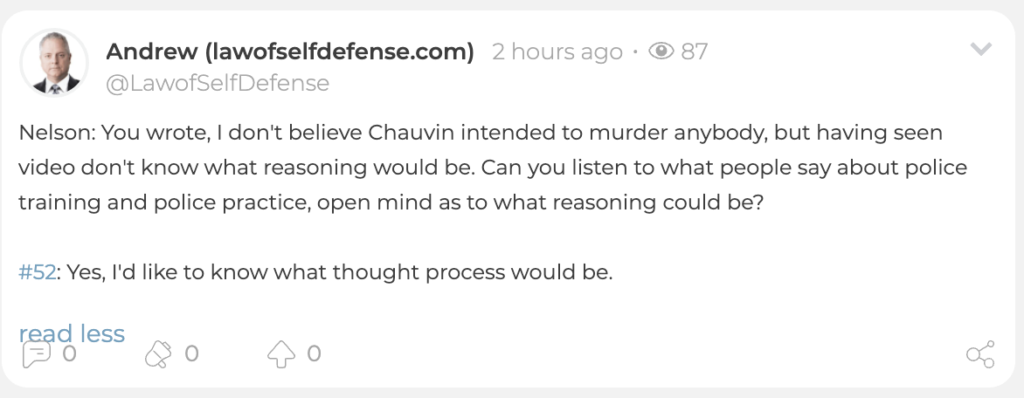
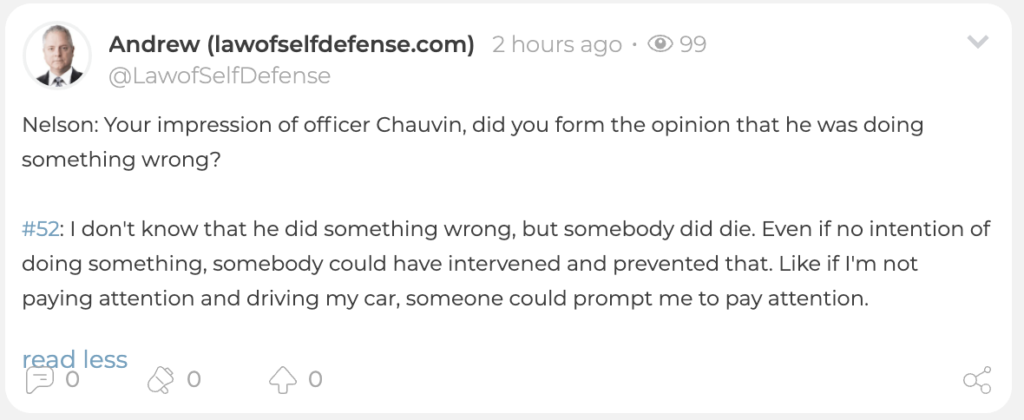
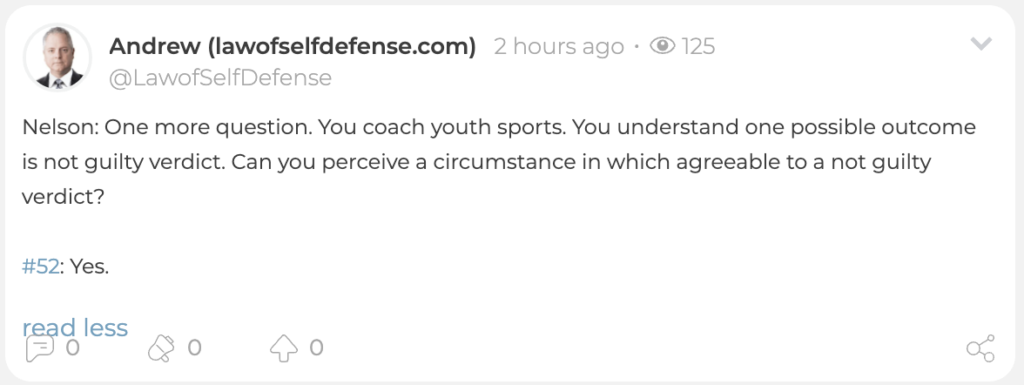

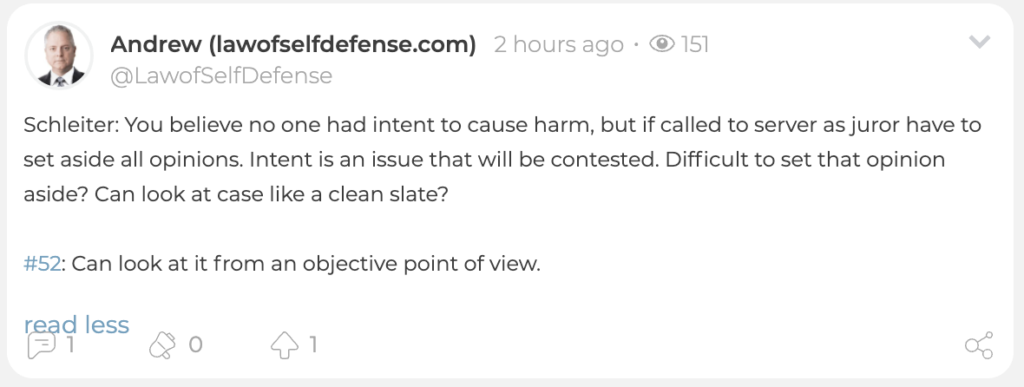

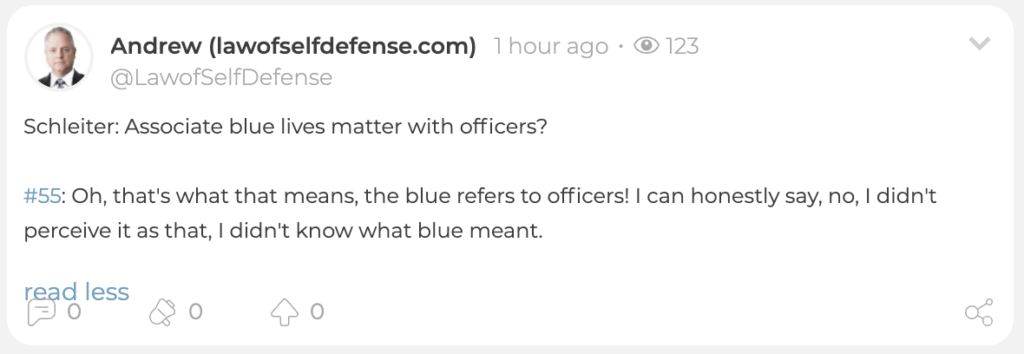







Comments
So given we have had a juror already dismissed explicitly because of the settlement, what do you think the likelihood that Chauvin’s legal team will succeed in their request for a venue change?
Because to me, when a judge ‘takes it under advisement’, it’s a really nice way of saying “no, but I don’t want to actually put that in writing”.
“Floyd was in reasonable apprehension, was genuinely claustrophobic, and had a reasonable basis for resisting the officers’ attempts to arrest him” after pulling him out of one car and attempting to stick him in another car…
The claustrophobia dodge is one of the most idiotic defenses I’ve ever heard in my life.
It doesn’t matter if you’re claustrophobic, merinthophobic, or cleithrophobic. You’re getting arrested in the back of a police car.
What do idiots who say things like this think is going to happen, the cops are just supposed to say, “Oh, our bad, you’re genuinely claustrophobic, I guess we WON’T arrest you today!”
You’re getting arrested. You’re getting put in handcuffs and taken to jail in a police car. Don’t like it? DON’T BREAK THE FUCKING LAW.
Well, you could make them walk alongside the car all the way to the precinct….
Yeah, I can foresee the screaming, too.
Or better yet… 😉 BODYCAM footage from two mounted police officers who tied the hands of an arrested black man together and marched him through the streets has been released.
The incident, which occurred in the Texas city of Galveston, sparked outrage after pictures were taken by passersby and uploaded to social media in August…
–Police on horseback march black suspect through Galveston, Texas – YouTube
–https://www.youtube.com/watch?v=Hm7HfXU0ZoM
-RETRIEVED-Mon Mar 15 2021 22:00:53 GMT+0100 (Central European Standard Time)
“If you prefer, we can strap you to the roof.”
I guess they’ll add a claustrophobia clause to Miranda.
“If you’re claustrophobic a big empty bus will be provided to take you to the police station.”
Claustrophobic AND a member of one of the current “protected classes”.
Subotai Bahadur
These large settlements are virtue signalling to the crowd how “valuable” a black person like Floyd is and why letting cities burn is understandable and permitted. Floyd pulled the same overdose stunt a year prior and would up in the hospital. This time his actions got the better of him. Minneapolis will do all that is necessary to justify all of their actions at the cost of truth and true justice. The trial is so badly tainted.
The leftwing politicians in charge very publicly declared Chauvin guilty by arranging and disclosing a pre-trial $27 million settlement.
No way he can get a fair trial anywhere near Minneapolis. They’ve made a mockery of the proceedings and officially declared it a politically motivated show trial.
My question is could this be used to appeal if the venue isn’t changed and he’s found guilty.
No way he can get a fair trial anywhere near Minneapolis.
That may very well be the point.
First off, Andrew, thank you for supporting Parler in all of your coverage. I think that’s an awesome move!
Secondly, the judge has said that the defense doesn’t need more strikes because they can be removed for cause? What about the jurors that have already been seated? If there’s no additional questioning of these jurors allowed, how can you determine if there is cause to remove them? Seems like another error unless I am misunderstanding his ruling.
Lastly, it seems that several people have gotten the message to try and get out of serving on this jury is to say you can’t be impartial and/or bring up the settlement. I’m afraid this is costing the defense smart people that actually would be impartial jurors but are afraid to sit on a jury and consider voting not guilty because of the backlash they would face both outside of the court and in the deliberation room. A change of venue seems like the most reasonable move at this point, but the judge seems adamant about keeping it in MN. I bet he gets at least some political pressure to do so as well (after all, there are attorneys in the state that are looking to build a career off of this).
“… but the judge seems adamant about keeping it in MN. ..”
I think it has to stay in Minnesota but maybe could be moved out of the city.
Good job on the Parler feed.
If the prosecution actually believed in their case, they would be able to prove it with the facts, and wouldn’t need to pack the jury with those who already think Chauvin is guilty.
Of course the prosecution has struck everyone that says they have an open mind. Unfortunately, there have only been 3-4 out of 60 so far.